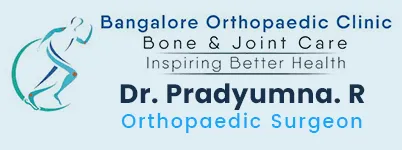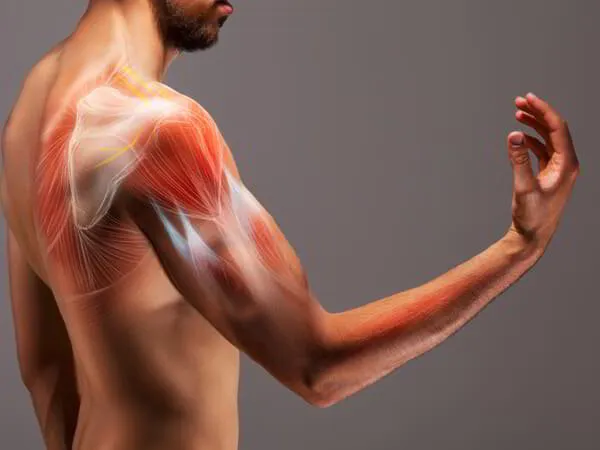Shoulder Pain
Home / Injuries & Conditions / Shoulder Pain
Dr. Pradyumna R carefully evaluate your conditions and symptoms associated to your shoulder pain or shoulder injuries, based on the diagnostic report and scan he would suggest if so, you are a candidate for Shoulder pain treatment, he is an highly experienced shoulder pain treatment specialist provides diagnosis as well as surgical and nonsurgical treatment options at Bangalore Orthopaedic Clinic, in BTM Layout, Bangalore.
If you have any queries or would like to schedule an appointment for shoulder pain or or shoulder injury treatment consultation please call +919113025188.
What is the cause of Shoulder Pain?
Causes of shoulder pain are numerous and may include inflammation of synovial joints, osteoarthritis, dislocation, separation, fracture, rotator cuff tendinitis, bursitis, labral tears, and other injuries. Shoulder pain occurs when different structures in the shoulder joint become damaged. The shoulder is one of the most movable joints in the body. It is also an unstable joint because of its range-of-motion. The shoulder joint also has to be supported by soft tissues muscles, tendons, and ligaments which are also prone to injury. Main causes of pain in the shoulder are diseases, wear and tear, degenerative conditions, overuse and under use.
The first step in the evaluation will include a comprehensive history and physical examination of the shoulder. Your doctor will ask how and when the pain started, whether it has occurred before, and how it was treated. He or she will observe your shoulder range of motion and strength, check for tender areas, deformities or swelling, and look for abnormalities.
What are the symptoms of shoulder pain?
Symptoms of shoulder pain can be mild, such as a dull ache that gradually builds over several weeks, or be a more sudden, sharp pain. Following are some symptoms of shoulder pain:
- Arm pain, neck pain, or back pain
- Muscle stiffness and weakness
- Limited range of motion
- Warmth or redness in your shoulder
- Clicking, popping, or grinding sensation when you move your arm
- Arthritis in the shoulder joint
- Bone spurs in the shoulder area
- Broken shoulder bone
- Dislocation of the shoulder
- Overuse or injury of nearby tendons, such as the bicep muscles of the arms
- Nerve injury that leads to abnormal shoulder movement
- Tears of the rotator cuff tendons
- Poor shoulder posture and mechanics
What are the specific shoulder conditions?
- Shoulder Instability
- Dislocated Shoulder
- Rotator Cuff Tear
- SLAP Tears
- Acromioclavicular joint (AC joint) dislocation
- Arthritis of the Shoulder
- Frozen Shoulder
- Shoulder Impingement
- Bicep Tendon Rupture
- Little League Shoulder
- Baseball and Shoulder Injuries
- Burners and Stingers
How are knee pain diagnosed?
Diagnostic procedures for shoulder problems may include the following: X-ray, Magnetic resonance imaging, computed tomography scan (also called a CT or CAT scan), Electromyogram (EMG), Ultrasound, Laboratory tests (to determine if other problems may be the cause) and Arthroscopy.
When to see a doctor
Most cases of should pain will get better on their own or with simple self-help treatments. Always seek medical attention if you experience severe shoulder pain after a fall or an accident. Seek immediate care from a health care provider if severe shoulder pain is accompanied by numbness, weakness or tingling. Do not try to ignore the pain or give it time to go away on its own.
What treatments are available for shoulder pain?
Since all shoulder conditions have different symptoms and causes, your doctor will be required to perform a thorough examination in order to precisely identify the problems.
To treat your shoulder pain, your doctor will recommend medication, rest, and physical therapy or also prescribe injections of numbing medicines or steroids to relieve pain depending on your condition.
If your shoulder pain is severe, or if you are experiencing an ongoing loss of motion in your shoulder, and the problem will not respond to other forms of more conservative treatment (such as rest, anti-inflammatory medications, physical therapy, and cortisone injections), surgery may be recommended. Surgical approaches include open procedures with large reconstructions and total shoulder replacement.
For more information on Shoulder Pain or Shoulder swelling or can't move shoulder, or red or blue color of skin around shoulder area and doesn’t improve after two weeks, had an injury or infection or shoulder injury diagnosis and treatment options available, please call +919113025188. Dr. Pradyumna R, Interventional Pain Management specialist serving BTM Layout, Bangalore City.

